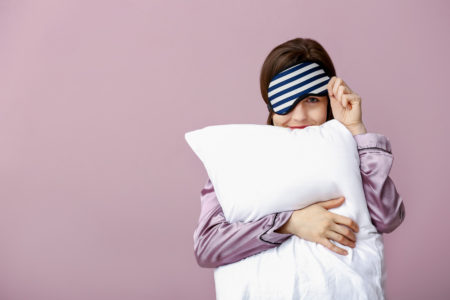What is Sleep Hygiene?
Good hygiene is important; keeping our bodies clean and maintained is part of good overall health. Why is it then that so many of us have poor sleep hygiene? In fact, many of us may not have even heard of sleep hygiene in the first place!
Like oral hygiene (brushing our teeth, flossing, etc.), sleep hygiene involves a series of daily practices and behaviors designed to keep you healthy and happy. Instead of focusing on your teeth and gums, sleep hygiene focuses on practices that help ensure you a restful night’s sleep.
Sleep hygiene includes things like what we eat or drink before bed, what time we go to sleep, or what time we wake up. By understanding best practices, we can aim for stellar sleep hygiene.
Why Does Sleep Hygiene Matter?
Without adequate sleep hygiene, you run the risk of becoming sleep deprived. Symptoms of sleep deprivation include:
– memory fog
– low energy
– poor decision-making skills
– irritability & increased stress
– reduced attention span
These symptoms can snowball and combine with others to create devastating effects on mental and physical health, which is why good sleep hygiene is so critical!
What Can We Do to Improve Our Sleep Hygiene?
- Reduce Anxiety Levels – Easier said than done, but important nonetheless! High stress before bed leads to poor sleep quality. Try deep breathing exercises, yoga, or meditation before sleeping. Another trick is to write down everything stressing you out and put it in a drawer until tomorrow – all that stress can wait!
- Watch what You Eat or Drink Before Sleep – Though a full belly might make you sleepy, it actually harms your overall sleep. Bodily resources go towards digesting, meaning your sleep is less restful and you may stay awake longer than you intend to. For this reason, you should also avoid midnight snacking. Caffeine is also a bad idea before bed; the stimulating effects make it harder to fall and stay asleep.
- Establish a Bedtime Routine – Your routine should begin around 30 – 60 minutes before you intend to go to bed. Make your bedtime routine your own, but make sure it focuses on rest and relaxation. Take a warm shower, do some deep breathing and yoga stretches, journal, read a book – anything that promotes feelings of wellness and relaxation.
- Limit Screen Time Before Bed – Notice how in #3 we didn’t mention being on any devices? And that’s for good reason! Electronic devices, like cellphones, emit blue light, which reduces melatonin levels in the brain. Melatonin is a hormone that helps regulate sleep. Your phone and other devices may keep you up in different ways as well. Buzzing, beeping or lighting up can all distract your mind from what it should be doing when you go to sleep – disconnecting from your day and winding down.
- Be Active – While heavy exercise before bedtime negatively impacts sleep, as little as 30 minutes of aerobic activity earlier in your day can have a huge impact on your sleep quality. It could be something as simple as a brisk walk or bike ride, or something as intense as a CrossFit workout. Not only will you sleep better, but you get all the benefits that come with exercising!
- Avoid Naps – We are all guilty of needing a nap at one time or another, but you shouldn’t make a habit out of it. The research isn’t clear yet, but preliminary studies show that napping negatively impacts older people more than younger people. If you find yourself needing a nap during the middle of the day, make sure it’s for 30 minutes or less. Also, avoid napping later in the day as that will make it more difficult for you to fall asleep later in the evening.
- Be Consistent About Bedtime and Wake Up Time – Your body loves routine – thrives on it, in fact. That’s why it’s so important to be consistent with your bedtime and the time you wake up. Though it may be tempting to sleep in on the weekend or other days off, it’s actually better for your overall sleep health to keep similar bed and wake times every single day.
- Limit Light and Sound – While some people may claim that they sleep better with the lights or the TV on, the research just doesn’t back this up. If you’re able to limit incoming light or noise, like with black-out curtains, for example, it greatly improves sleep quality. Sleep masks and ear plugs also work, though they may take some getting used to.
- Set a Cooler Sleeping Temperature – Our body is designed to have a dip in temperature at nighttime. It’s one of our body’s signals to shut down and get some rest. You can aid this process by setting your thermostat between 60 – 67 degrees Fahrenheit, which has been empirically shown to produce the best overall sleep. It might be a little chilly for some, but you’ll get a great night’s rest!
- Scans by Balanced Health! – A Full Scan from Balanced Health is a key tool in understanding your own body’s health and balance – it’s right there in the name!. Find out what resonating food sensitivities may be keeping you awake at night with a rumbling stomach. Maybe you’re missing key nutrients to aid your body in resting itself. Or perhaps you have an organ system that is energetically out of balance. A Balanced Health Full Scan will give you all of that information and MORE! Order one today and better sleep will be sure to follow!
Don’t Forget!
- Stay current with our blog, including this previous post about fatigue.
- Check out our Full Scan and ALL of our other scans!
